Timmons Meets With Leaders in Brussels and Paris

The NAM wrapped up its “Competing to Win” Tour in Europe with key meetings in Brussels and Paris, cementing important partnerships and building consensus on the imperative to strengthen U.S. alliances with European nations. It also advocated policies that will enable manufacturers to withstand geopolitical risks and threats to global stability.
Brussels power meetings: In Brussels, the epicenter of EU political activity, NAM President and CEO Jay Timmons met with a who’s who of experts deeply involved in trade and economic policy. He touched on a wide range of priorities including free trade agreements, permitting reform in the United States, IP, energy security and regulatory certainty.
- Timmons met with top trade policy leaders in the EU, including Tomas Baert, a trade adviser to European Commissioner Ursula von der Leyen, and Member of European Parliament and Chairman of the Trade Committee Bernd Lange.
- The team also met with BusinessEurope, led by Director General Markus Beyrer and Deputy Director General Luisa Santos, and participated in a roundtable organized by BDI Brussels Head of Office Heiko Willems. The roundtable also included some of BDI’s leading German member companies.
Evening event: The finale of the day in Brussels was a reception co-hosted by NAM Council of Manufacturing Associations member Distilled Spirits Council at the residence of U.S. Ambassador to the EU Mark Gitenstein.
- Timmons and NAM Vice President for International Economic Affairs Ken Monahan discussed the U.S.-EU relationship and the NAM’s priorities with key EU leaders on trade, including European Parliament members Reinhard Hans Bütikofer and Radek Sikorski.
French connection: In France, Timmons met with the ardent champion of manufacturing Benoit Bazin, chief executive officer of Saint-Gobain, one of the world’s largest building materials companies and the manufacturer of innovative material solutions. In North America, Saint-Gobain has approximately 150 locations and more than 15,000 employees.
- The NAM also visited AmCham France. Managing director Eglé de Richemont said following the meeting: “Today, AmCham France had the privilege to welcome three top representatives from the [NAM] to discuss over key themes, including the importance of close economic partnership between the U.S. and France, the criticality of resilient manufacturing in the U.S., France and across Europe and the importance for manufacturers of standing with Ukraine now and tomorrow for the rebuilding of the country.”
The final word: After meeting with other manufacturers on the final leg of his tour, Timmons remarked “We’ve been hard-charging now for almost two weeks, and it’s truly inspiring how unified our partners across the Atlantic are in their solidarity with Ukraine and in meeting this moment with not just talk but also action. We’re just getting started.”
Timmons Talks Trade, Economy and Jobs
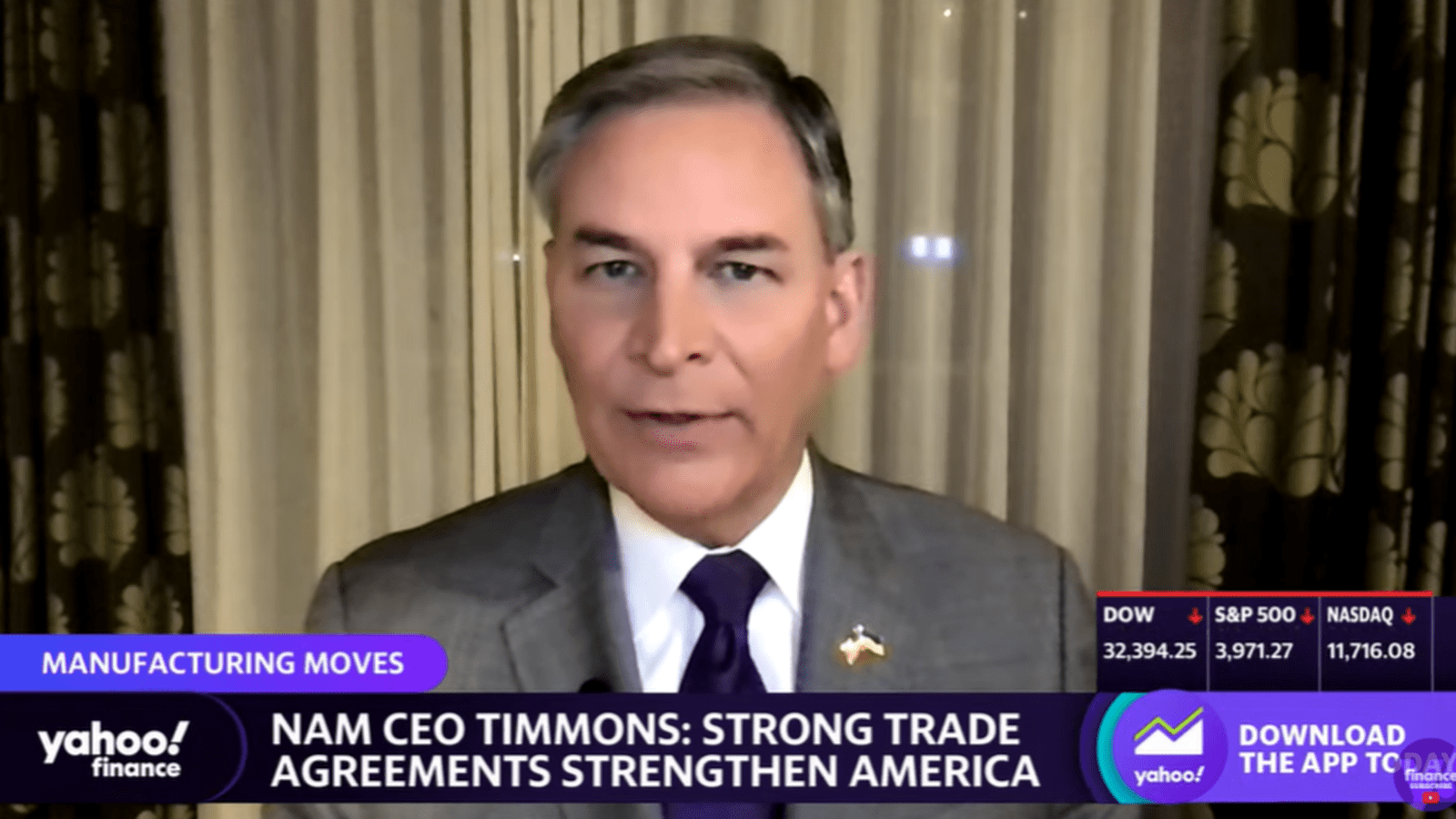
Solid international relationships will see us through any crisis, and artificial intelligence will add jobs to manufacturing, not remove them. Those were just two of the messages driven home by NAM President and CEO Jay Timmons during a Yahoo! Finance interview this week.
- Timmons gave the interview after a busy few days in London as part of the Competing to Win Tour in Europe, where he met with U.K. leaders and the U.S. ambassador to discuss strengthening the U.S.–U.K. alliance.
Trade deal needed: To ensure future manufacturing competitiveness, the U.S. needs a “robust agenda” from the Biden administration—now, said Timmons.
- “We haven’t seen a trade deal negotiated in our country or with our country for four presidencies,” continued Timmons. “We’re growing manufacturing in the United States thanks to the 2017 tax reforms, thanks to the infrastructure investment legislation, thanks to the CHIPS and Science Act.”
- “But … 95% of the world’s customers live outside of the United States. And we can strengthen our supply chains and we can also sell our products if we have the right trade agreements in place.”
Uniting to solve problems: Reinvigorating historic alliances is crucial to overcoming “any obstacle,” said Timmons.
- “[W]e want to make sure that our allies are … able to work together to solve some of these big macroeconomic issues, whether it’s a banking crisis or whether it’s increasing trade opportunities,” Timmons said.
AI: Meanwhile, AI will only expand and improve workers’ jobs, not replace human beings, Timmons said.
- AI is “going to [have] an incredibly positive impact on the sector because it is going to enhance manufacturing capability and output and it’s going to be a supplement to jobs all across the world,” Timmons said.
- “Think about all the technological advances we’ve had over the course of the last few decades, but especially the last five to 10 years. All of these advances have given additional capabilities to the workers.”
Filling jobs: Also needed is a strong workforce. Timmons discussed some of the findings of the NAM’s test Manufacturers Survey, in which nearly 75% of manufacturers cited attracting and retaining quality employees as a top challenge.
- He touched on some of the many initiatives of the Manufacturing Institute, the NAM’s 501(c)3 workforce development and education affiliate, to shore up labor force participation. These include second chance hiring, Creators Wanted—which seeks to inspire tomorrow’s workforce—and more.
The last word: “And that takes this full circle,” Timmons said. “Young people are learning new skills when it comes to technology. Robotics, artificial intelligence, augmented reality, all of those things are what modern manufacturing is all about. And the next generation are the ones that are going to deliver for us.”
NAM to EPA: Don’t Change NAAQS Standards
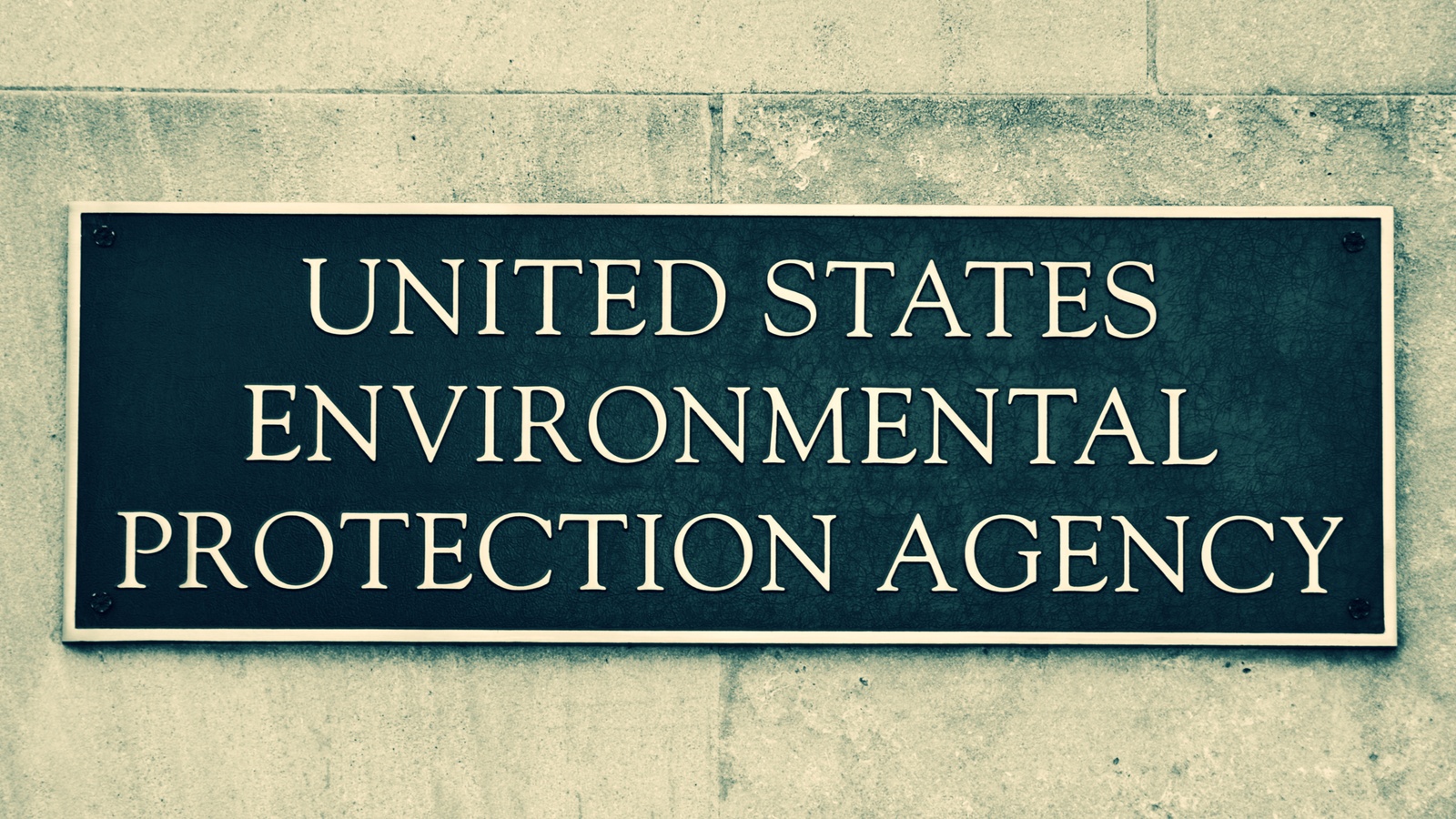
The NAM continues to push back against proposed revisions to the National Ambient Air Quality Standards for particulate matter.
What’s going on: On Tuesday NAM Director of Energy and Resources Policy Chris Morris urged the Environmental Protection Agency to withdraw its recent proposal to lower the primary annual particulate matter standard from 12.0 µg/m3 to between 8.0 and 10.0 µg/m3.
The big picture: “Manufacturers in the U.S. have become leaders in environmental stewardship and sustainability,” Morris pointed out.
- “Across the board, levels of major pollutants have declined dramatically, and the United States is outpacing our global competitors in air quality improvements,” he said.
- “According to the EPA, the U.S. has reduced six common NAAQS pollutants, including PM5, by 78% between 1970 and 2020. Additionally, the EPA data show that PM2.5 air quality has improved 43% between 2000 and 2020.”
The new regulations: The EPA’s new standards would impose a substantial economic burden on manufacturers, Morris continued.
- “First, there is the direct economic exposure manufacturers will face, which is a measure of the gross value added or employment in the manufacturing sector that could be affected or [placed] at risk,” he said.
- “Second is the indirect economic exposure of manufacturing as a result of a stricter PM5 standard. This refers to the effects on the sector as the consequences are felt throughout the supply chain due to decreased overall investment.”
By the numbers: The EPA has estimated the total cost of the controls required for compliance with the proposed standard at up to $1.8 billion—and that figure could go higher, the agency admitted.
- This expensive policy will lead to job losses and fewer new manufacturing facilities, as well as fewer modernizations and expansions to existing facilities, Morris continued.
Unattainable standards: What’s more, some areas in the U.S. are “in non-attainment” with the current PM2.5 standard, so a stricter standard will only put them further out of compliance, Morris told the EPA.
What should be done: To keep U.S. manufacturing competitive and to safeguard well-paying jobs, Morris said, the EPA should maintain the current annual particulate-matter standard of 12.0 µg/m3 and withdraw its proposal.
The NAM in action: The NAM has been rallying manufacturers across the country to speak out against the EPA’s proposal and calling on Congress to oppose these harmful regulations.
- During the 2023 State of Manufacturing address last month, Timmons announced the launch of a nationwide campaign to maintain these standards in order to protect manufacturers.
Manufacturers: Permitting Reform Boosts Our Competitiveness
Timmons: Amid global threats, bill reduces our dependence on bad actors and ensures we can support our allies
Washington, DC – In advance of today’s scheduled vote in the U.S. House of Representatives on H.R. 1, the Lower Energy Costs Act, National Association of Manufacturers President and CEO Jay Timmons released the following statement:
“America’s economy, our institutions and our values are being challenged by threats from around the world, which means now is the time to strengthen our energy security and expand domestic manufacturing—both to reduce our dependence on bad actors and to ensure we can support our allies. This bipartisan action to modernize permitting reform would help us achieve these goals by speeding up critical energy, infrastructure and manufacturing investments while we continue our commitment to environmental stewardship,” said Timmons. “I am in Europe right now, witnessing firsthand the consequences of being overly reliant on a country like Russia for energy. In the 21st century, there’s no excuse for letting job-creating projects languish for years to get bureaucratic approval. The Lower Energy Costs Act will bolster manufacturers’ competitiveness in America while also bringing relief to American families and businesses. We thank Speaker McCarthy, Majority Leader Scalise and Majority Whip Emmer for designating this bill as their top priority and for their focus on ensuring our industry can continue providing the leadership our country and our world need.”
Background: In the NAM’s latest Manufacturers’ Outlook Survey, more than 74% of respondents said that permitting reform—which would simplify and speed up the approval process for new projects—would be helpful to their manufacturing company, allowing them to hire more workers, expand their business or increase wages and benefits.
-NAM-
The National Association of Manufacturers is the largest manufacturing association in the United States, representing small and large manufacturers in every industrial sector and in all 50 states. Manufacturing employs nearly 13 million men and women, contributes $2.81 trillion to the U.S. economy annually and accounts for 55% of private-sector research and development. The NAM is the powerful voice of the manufacturing community and the leading advocate for a policy agenda that helps manufacturers compete in the global economy and create jobs across the United States. For more information about the NAM or to follow us on Twitter and Facebook, please visit www.nam.org
The NAM Revives High-Level U.S.–U.K. Talks
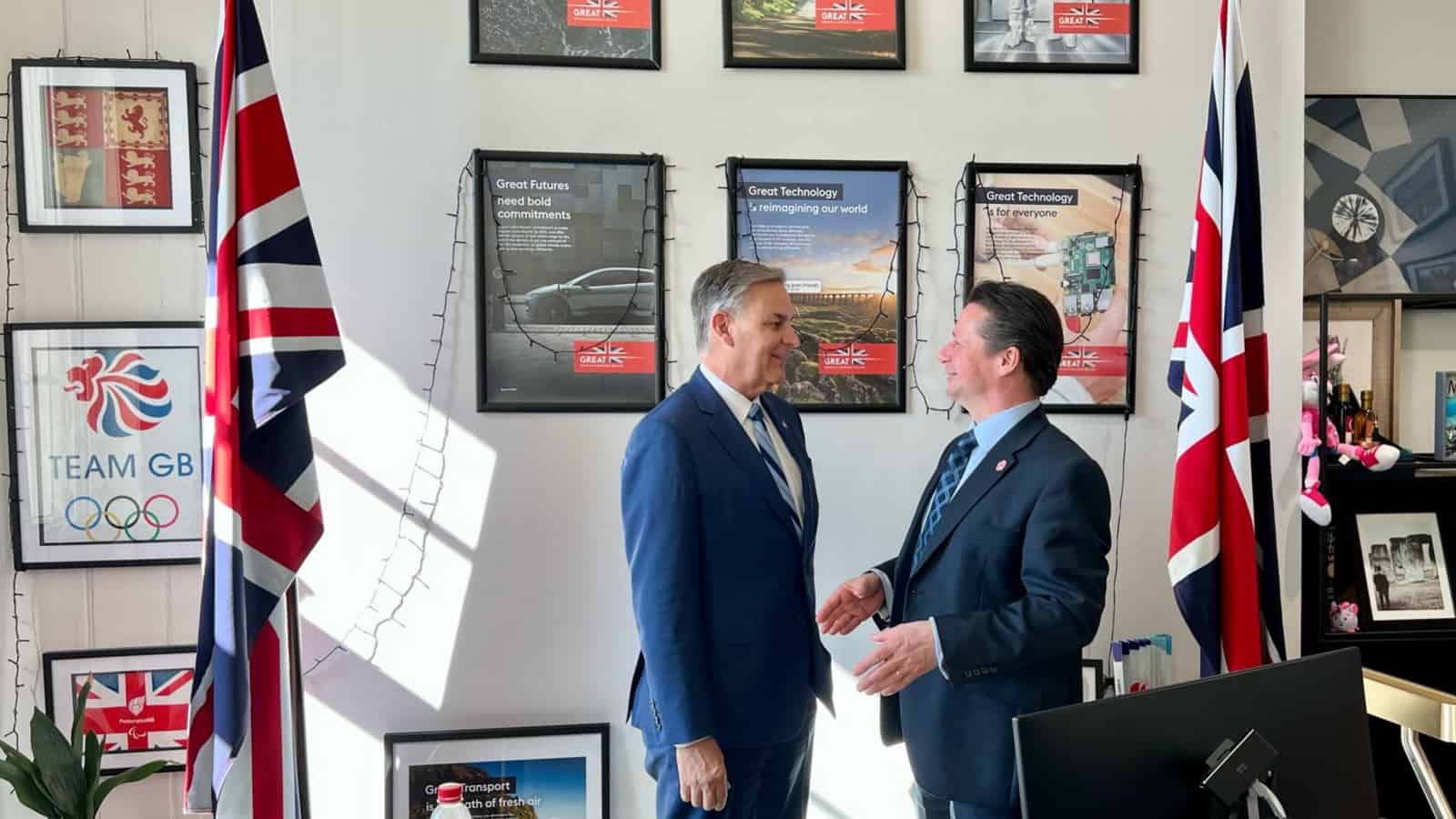
The NAM’s Competing to Win Tour in Europe moved on to London early this week, highlighting the imperative to shore up the U.S.–U.K. relationship—and to urgently address other barriers, like permitting reform and workforce shortages, to enable the U.S. to help allies in the face of Russian aggression and other geopolitical threats.
The issue: Russia’s unprovoked war in Ukraine, the aftermath of the worldwide pandemic and China’s quest for global leadership create a new urgency for expanded trade opportunities between democratic countries.
- The U.S. and the U.K. must work together to shore up supply chains, enhance energy security, boost resiliency and create growth, as NAM President and CEO Jay Timmons emphasized.
The details: Timmons crisscrossed London on Monday and Tuesday, promoting the manufacturing industry and reinforcing its priorities with senior government ministers and officials, including:
- Nigel Huddleston MP, the U.K. minister of state for international trade
- Jonathan Reynolds, Labour Party shadow business secretary (one of the architects of the Labour Party’s industrial plan)
- Jane Hartley, U.S. Ambassador to the Court of St. James’s
Support at home: During his visit, Timmons did an interview with CNN International to discuss the NAM’s new Outlook survey, which found that 77% of manufacturers want to see more trade agreements with Europe.
Making industry connections: At the NAM’s sister organization Make UK, Timmons joined a roundtable with CEO Stephen Phipson and addressed some of Britain’s leading manufacturing companies.
- He spoke about how the U.S. and the U.K. can unlock new trading opportunities going forward and bolster democracy by strengthening commerce.
- The two groups also reaffirmed their commitment to share market intelligence, data and policy work, as well as to facilitate visits for economic delegations promoting trade, investment and commercial opportunities.
- They also voiced their continued and mutual support of the Ukrainian people and of the democratic institutions in their own countries.
What they said: “The ties between the UK and United States go back a long way and we have significant political, economic and trade connections,” said Phipson. “Relations with the US are vital and its market is the second most important for UK goods. In a post-Brexit world, it is likely to assume ever greater importance as part of our efforts to boost global trade.”
- “As world events have made abundantly clear, strengthening democracy, the free enterprise system and strategic alliances in our countries and around the world is essential to our future and the fight against tyranny,” said Timmons. “As the U.S. and the U.K. take steps to build a stronger, more open and secure economic relationship, the NAM urges our leaders to move toward a new U.S.–U.K. market-opening trade agreement that includes strong, clear and enforceable outcomes.”
Meeting manufacturers: In addition, Timmons met with manufacturers that have operations or pending operations in both the U.K. and the U.S. Energy security and regulatory certainty, as well as the worker shortage in the industry, also took center stage in these discussions.
Bottom line: “The tour’s time in London matters to manufacturers in the United States because it strengthens the ‘special relationship’ between the U.S. and the U.K. and boosts the prospects for enhanced cross-Atlantic trade, supporting manufacturing jobs in both countries,” said Ken Monahan, NAM Vice President of International
Timmons Finishes First Week in Europe
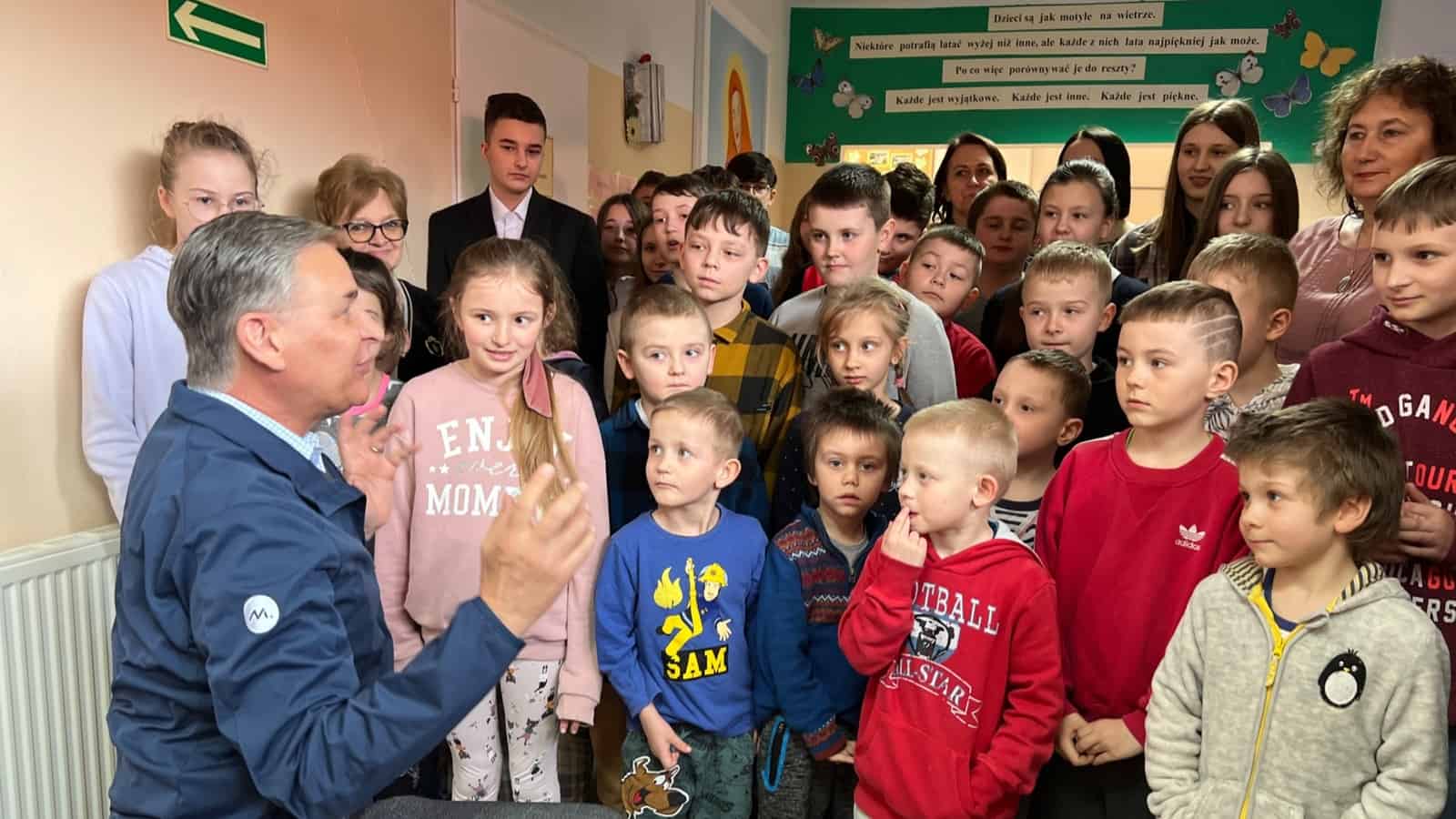
NAM President and CEO Jay Timmons concluded week one of the Competing to Win Tour in Europe by visiting a Polish school supported by UPS as well as a Pratt & Whitney facility, where he reflected on the role of manufacturing in protecting democracy.
The school: Timmons visited the elementary school in Lipa, Poland, which has been supported by UPS and served as a safe haven for Ukrainian refugee children at the start of the war.
- During his visit, Timmons discussed the needs of the children and met with the students and teachers in the town, which is near the Ukrainian border.
- He also met with an administrator from a sister school on the Ukrainian side of the border to discuss how the children there are faring.
“Arsenal of Democracy”: In addition, Timmons visited the Pratt & Whitney manufacturing campus in Rzeszów, which employs 5,000 workers and manufactures commercial and defense equipment.
- Timmons not only got a firsthand look at a company that is reinforcing the U.S.–EU commercial relationship, but also learned about the company’s response to the Ukrainian refugee crisis, which includes team members providing housing, aid and volunteer hours.
Visiting Auschwitz: Timmons visited the concentration camps at Auschwitz-Birkenau on Saturday and saw the horrific evidence of the atrocities committed at the site, where more than 1.1 million people perished.
- Following the visit, he warned against the dangers of authoritarianism and the importance of standing up for democracy and common values of respect and decency. He also noted, as highlighted during the Auschwitz-Birkenau tour, that businesses acquiesced or participated in mechanisms that advanced the aims of the Axis powers.
- Timmons emphasized manufacturing’s power to improve lives and protect freedom for people around the world. However, he also noted the dangers of command-and-control governments dictating the industry’s aims, citing the Holocaust and World War II as examples of how manufacturing can be used as a malevolent force.
The last word: “The American business community has an obligation to stand up for our democratic system and to hold our leaders responsible for their actions—and their rhetoric,” said Timmons.
- “Manufacturers in America, in particular, are a force for good. But we must never let our guard down or take our democracy for granted, no matter how difficult it may be to uphold what is right in the United States and around the world.”
Next up: The tour continues this week, with Timmons visiting high-level government and industry leaders in London, Brussels and Paris.
President Biden’s Visit to Canada Strengthens Democratic Alliances and Promotes North American Manufacturing Growth
Washington, D.C. and Ottawa, Canada – The following is a joint statement from National Association of Manufacturers President and CEO Jay Timmons and Canadian Manufacturers & Exporters President and CEO Dennis Darby on the occasion of the first official visit of U.S. President Joe Biden to Canada:
“The historic ties between Canada and the United States have created one of the strongest bilateral partnerships of any two countries in the world. As neighbors, friends and as manufacturers, we have always worked together to support our industry and the millions of jobs it provides.
“President Biden’s visit to Canada is an opportunity for our two countries to rededicate ourselves to deepening these ties, to redoubling our efforts to grow North American manufacturing and to taking full advantage of the United States–Mexico–Canada Agreement.
“To achieve these goals, we must support regional integration, supply chain resilience and sustained economic growth, innovation and jobs. We must also continue to coordinate our efforts to address climate change, develop critical minerals and drive the clean energy transition, while also ensuring that manufacturers across our region have access to all forms of energy.
“As world events make abundantly clear, strengthening economic and strategic alliances between democracies is essential to our future and to countering those that want to undermine our way of life. At every opportunity, we must strengthen democracy and the free enterprise system in our countries and around the world.
“We must take on all these challenges, together, so that the manufacturing industry can continue to lead our economies forward and drive our countries’ continuing prosperity. As our history has proven time and again, when we work together, we accomplish big things and improve the quality of life for all.”
-NAM-
The National Association of Manufacturers is the largest manufacturing association in the United States, representing small and large manufacturers in every industrial sector and in all 50 states. Manufacturing employs nearly 13 million men and women, contributes $2.81 trillion to the U.S. economy annually and accounts for 55% of private-sector research and development. The NAM is the powerful voice of the manufacturing community and the leading advocate for a policy agenda that helps manufacturers compete in the global economy and create jobs across the United States. For more information about the NAM or to follow us on Twitter and Facebook, please visit www.nam.org.
-CANADIAN MANUFACTURERS & EXPORTERS (CME)-
From the first industrial boom in Canada, CME has advocated for and represented member interests. 150 years strong, CME has earned an extensive and effective track record of working for and with 2,500 leading companies nationwide. More than 85 per cent of CME’s members are SMEs and collectively account for an estimated 82 per cent of total manufacturing production and 90 per cent of Canada’s exports.
The NAM Talks Democracy, IP and Trade in Geneva
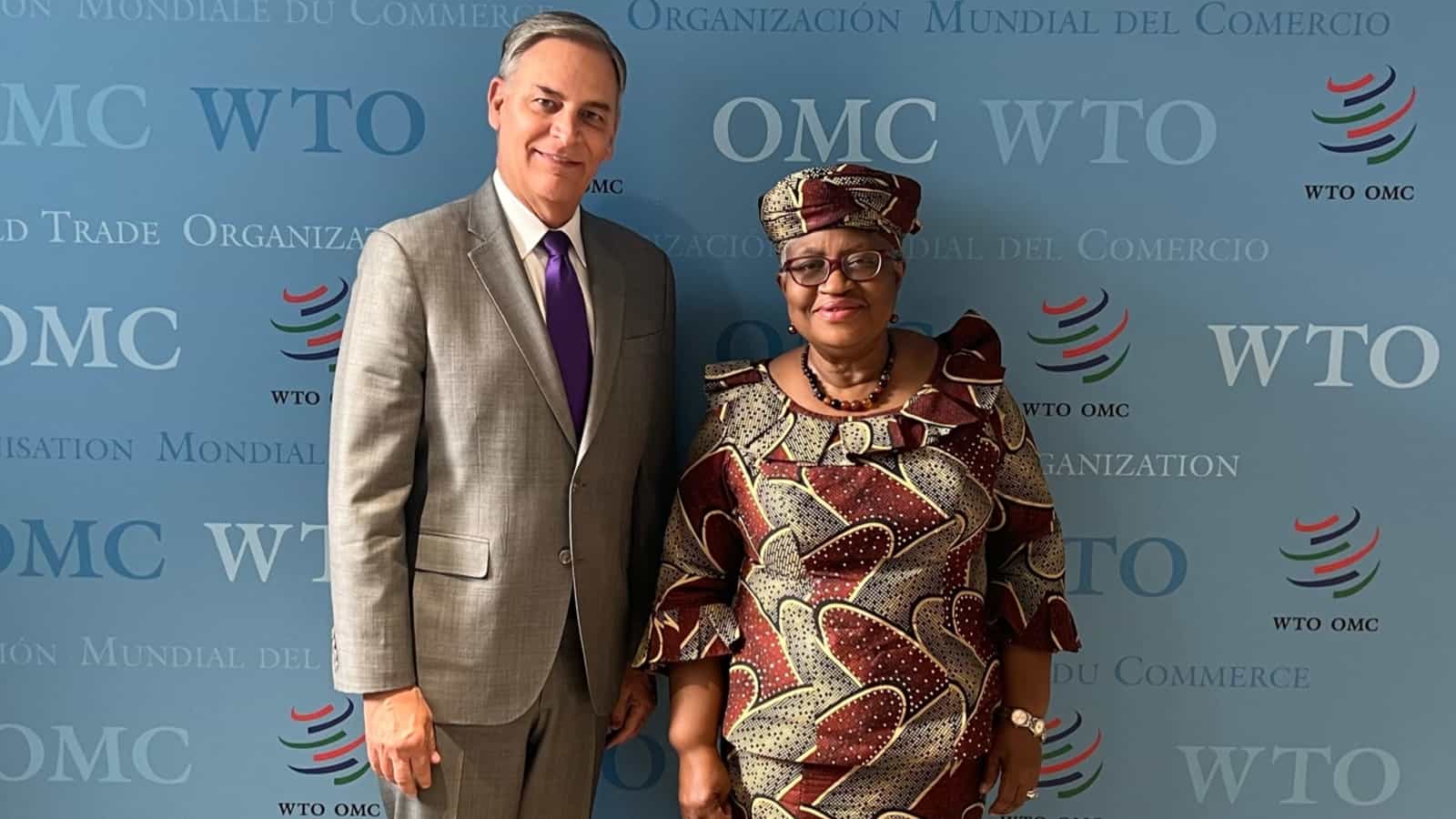
On the first two days of the NAM’s Competing to Win Tour in Europe, Timmons took part in “frank and engaging” discussions with global leaders in Geneva. The conversations focused on reinforcing transatlantic partnerships, bolstering democracy, addressing trade challenges and emphasizing the crucial role manufacturers play in promoting global stability.
The details: Timmons met with influential figures including WTO Director-General Dr. Ngozi Okonjo-Iweala, WTO Deputy Director General Angela Ellard, U.S. Ambassador to Switzerland and Lichtenstein Scott Miller and U.S. Deputy Chief of Mission in Geneva David Bisbee.
- NAM representatives also participated in an event on intellectual property co-hosted by the NAM and the International Federation of Pharmaceutical Manufacturers and Associations.
The substance: In the meetings, Timmons delved into the negative impact of the WTO/TRIPS waiver expansion, the need to restore the WTO dispute settlement system’s functionality and the crucial role of manufacturers in supporting democracies and global institutions.
- ‘“Frank & engaging discussion w/ @JayTimmonsNAM CEO of the US National Association of Manufacturers & his delegation. Focused on geopolitical tensions & impact of @wto, challenges w/ the TRIPS waiver extension to therapeutics & diagnostics, dispute settlement system & road to #MC13 [the WTO’s next ministerial conference in early 2024],” tweeted Okonjo-Iweala following the meeting.
Speech in brief: At the IFPMA event, first covered by Politico, Timmons stressed the significance of IP protections in driving innovation and developing new treatments, reinforcing the NAM’s opposition to an expansion of the TRIPS waiver to cover diagnostics and therapeutics. Attendees included Geneva-based government delegations, the WTO secretariat and NAM member companies.
- “In America, our industry works to advance the values of free enterprise, competitiveness, individual liberty and equal opportunity—the values that keep our industry strong,” said Timmons. “But increasingly, we find these values, which so many of us share, under attack—in particular from authoritarian regimes that have little regard for free markets and little respect for an individual’s right to determine their own destiny. That’s why our transatlantic relationship matters more than at any time in recent memory.”
- “[O]ne of the most important ingredients for innovation is how a country protects intellectual property. IP enshrines the understanding that years or even decades of hard work and sleepless nights, millions and millions of dollars and so much more will be rewarded,” he continued.
- “Expanding this [WTO/TRIPS waiver of IP] would set a precedent that would spiral across the manufacturing sector,” he concluded. “Some voices—here in Geneva and around the world—are already expressing desires to implement similar waivers for renewable and green energy technologies, or to automatically trigger an IP waiver for any future pandemic. If we don’t draw the line now, the outcome is obvious: an anti-innovation domino effect that destroys jobs, livelihoods and lifechanging products.”
The big picture: More than a worldwide center for diplomacy, Switzerland is the seventh largest investor in the U.S. Timmons’s visit comes at a critical inflection point for the country and amid heightened stresses on global institutions, due to COVID-19, Russia’s unprovoked war in Ukraine and competition with China, among other geopolitical challenges.
News coverage: Politico’s Morning Trade newsletter spotlighted Timmons’s trip, while The Wall Street Journal (subscription) quoted him on the importance of new U.S. trade agreements.
Next up: The tour will continue in Frankfurt, Germany, where the NAM will further demonstrate manufacturers’ leadership and the potential for a more robust transatlantic alliance.
Senators Reintroduce Crucial R&D Bill
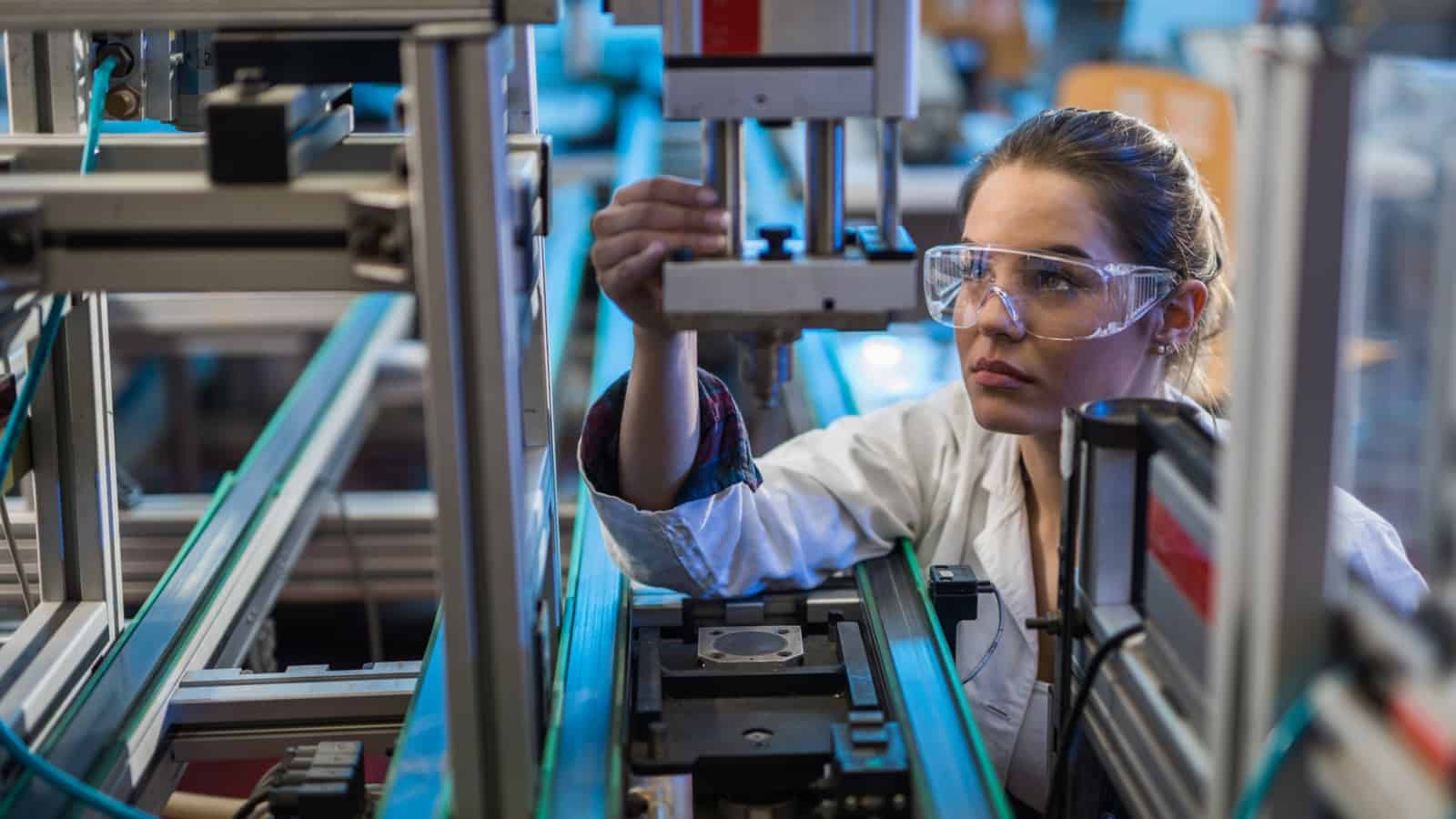
A bipartisan Senate duo introduced legislation on Thursday that would both allow businesses to once again fully deduct R&D expenses in the year they are made and expand the refundable R&D tax credit.
What’s going on: The American Innovation and Jobs Act, sponsored by Sens. Maggie Hassan (D-NH) and Todd Young (R-IN), would restore the immediate deductibility of R&D expenses. Last year, a tax change went into effect requiring companies to amortize or deduct their R&D investments over a period of years, making R&D more costly.
Why it’s important: According to a recent NAM analysis, the sector would lose nearly 60,000 jobs and face an output decline of more than $31 billion this year alone if the change is not reversed.
- The U.S. has now become a global outlier, joining Belgium as the only other developed country requiring the amortization of R&D expenses.
- Meanwhile, China provides a 200% “super deduction”—20 times the amount allowed in the U.S. tax code—for its manufacturers’ research.
The NAM says: “Manufacturers applaud the introduction of the American Innovation and Jobs Act, which will help the U.S. out-compete China,” said NAM Managing Vice President of Tax and Domestic Economic Policy Chris Netram.
- “Across the country, manufacturers are hiring workers, investing in communities and creating the products, materials and processes that drive us forward. Congress should approve the American Innovation and Jobs Act quickly to support critical research that allows manufacturers to improve lives in America and for people around the world.”
Learn more: Read our stories on how the 2022 expensing requirement is impacting International Paper, Marlin Steel Wire Products, Ultragenyx, Miltec UV and Brewer Science (whose story was also covered today by The Wall Street Journal, subscription).
NAM Goes to Europe to Strengthen Partnerships
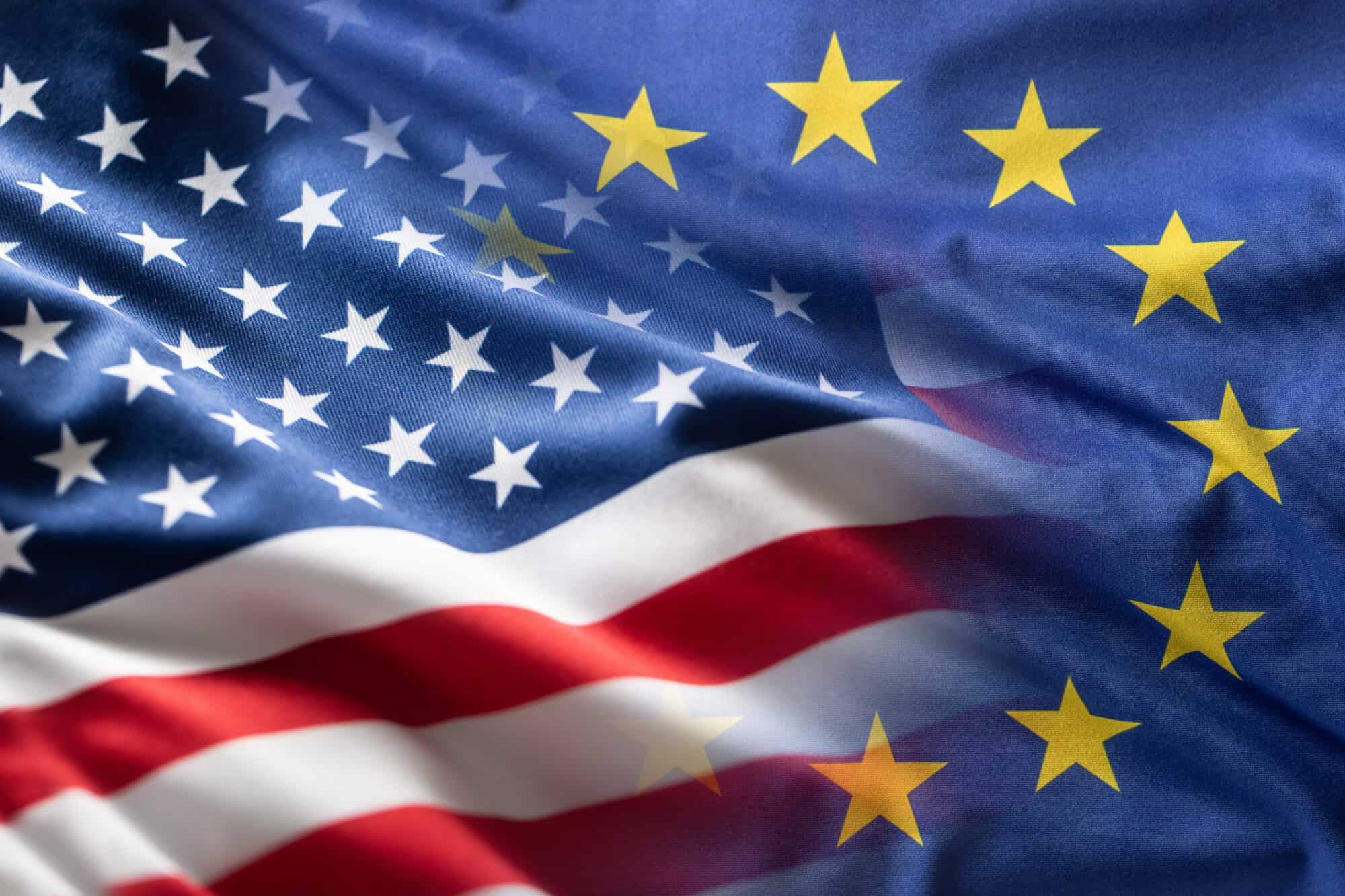
Ukrainian President Volodymyr Zelenskyy’s speech at the recent NAM board meeting highlighted the importance of manufacturers in the U.S. to the world at large. But it also made another, implicit point—that the NAM has a robust platform for engaging global leaders on issues critical to the industry.
NAM President and CEO Jay Timmons heads across the Atlantic next week to bolster these strategic alliances, as well as advance key competitiveness priorities and elevate manufacturers’ role as the “Arsenal of Democracy.” While there, he will affirm the values shared by Americans and Europeans alike, including free enterprise, competitiveness, individual liberty and equal opportunity.
The itinerary: The trip will take Timmons to Switzerland, Germany, Poland, Belgium, France and the United Kingdom, during a critical inflection point for U.S.–European Union and U.S.–U.K. partnerships.
- Timmons will take part in high-level meetings with government officials, international intergovernmental organizations like the World Trade Organization, U.S. embassies and European trade association counterparts.
- He will also meet with global manufacturing leaders, visit sites vital to the U.S.–European alliance and draw attention to the support manufacturers are providing in key countries like Poland.
The trade theme: Ahead of this trip, Timmons recently urged President Biden to resume forging trade agreements with our international partners, both in Europe and around the globe.
- As Timmons put it, “By advancing an ambitious trade agreement agenda, we can ensure that the U.S.—and not competitors like China—writes the rules for the global economy and trading system.”
- “At a time when democracy and free enterprise are under attack from forces around the world, America, as it has done in decades past, can provide the leadership needed to defend our values, our institutions and our way of life.”
The bigger picture: Timmons’ Europe trip follows many other NAM efforts to engage with international partners, which include recent meetings with Danny McCoy, CEO of the Irish Business Employers Confederation, and Goldy Hyder, president and CEO of the Business Council of Canada.
- It also follows Timmons’ trip to Mexico as a part of the U.S.–Mexico–Canada business delegation meetings at the North American Leaders’ Summit.
- Among other key moments, he communicated directly to new Mexican Economy Minister Raquel Buenrostro the myriad of regulatory and trade policies that violate the spirit, if not the letter, of the United States–Mexico–Canada Agreement.
The last word: “The NAM’s competitiveness agenda isn’t just something we can achieve here at home,” said NAM Executive Vice President Erin Streeter.
- “It requires action and partnership abroad, particularly in Europe. Russia’s aggression in Ukraine and COVID-19 are just two examples of why the resilience and strength of the transatlantic alliance is so important.”
- “We’re looking forward to the impact we’ll make for manufacturers in the U.S. and in defense of our shared values.”
